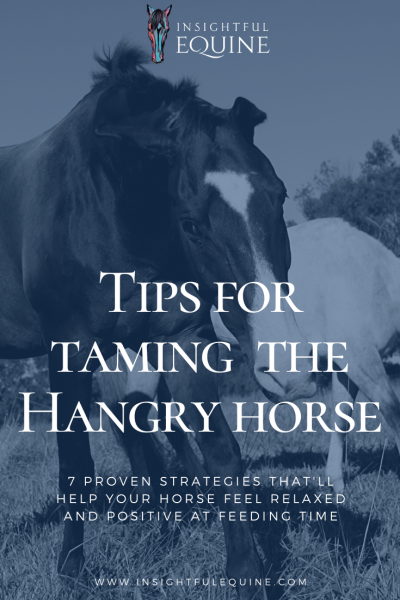Does Your Horse Turn Into A Fire Breathing Monster Around Food?
7 strategies to tame their hunger & help them feel more relaxed around food without overfeeding or using intimidation tactics.
Understanding where your hangry horse is coming from
Feeling hungry is not a natural state for a horse to be in. In nature when a horse feels hunger that’s its signal to seek food. If it cannot seek and find food it’s system is then kicked into overdrive – “find food or you will starve to death”.
Obviously, our horses are not at risk of starving to death but much like our own bodies, their primitive survival mechanisms don’t know the difference between a perceived threat and actual threat. Picture the feeling you get when you’re running late to an important event. Your brain says oh no will never make it on time. Your body is then automatically triggered into a stress response (you start to sweat, breathing gets shallow, heart rate goes up, etc). Your body doesn’t know the difference between “never making it on time” meaning that you arrive 15 minutes late and are incredibly embarrassed vs “never make it on time” so you’ll get taken out by a sabertooth tiger. It responds the same way to both scenarios.
This automatic stress response is much like your horse being triggered into survival mode by hunger that he is helpless to resolve. So remember when you see your horse acting like he is afraid of starving to death it could very well be because his body is telling him that he will.
Instincts don’t have to run the show every time. Making a few small changes can have a huge effect on how often and to what degree our horses become triggered by (survival style) hunger and how they respond to that feeling.
Seven Strategies For Taming The Hangry Horse
1. Balance the vitamins and minerals
Deficiencies often lead to the urge to overeat as their bodies seek more vitamins and minerals – most “ration balancers” and “complete” feeds are not designed to balance the diet of any specific horse but rather are meant to be for the average horse, on average work, eating average hay, and grazing on pastures with average vitamin and mineral content. Because the vitamin and mineral content varies so much in each area of the country the feed manufacturers usually end up keeping the vitamin and mineral content in their products very low to avoid the potential for toxicity. This leads to nutritional deficiencies in your horse and their bodies trying to make up for those by triggering them to want to eat more food. Balance the vitamins and minerals and you’ll see a huge difference in their behavior.
2. Feed more small meals throughout the day
Using slow feed hay nets to keep small amounts of food moving throughout their digestive tract keeps acid at bay and keeps them busy longer just like if they were out grazing.
3. Feed with instincts in mind
You can also slow down their eating and encourage them to use their food-seeking instincts by spreading their hay out. Scattering your horse’s hay into several areas throughout their paddock and pasture will not only keep them moving but will also make them feel satisfied.
4. Prevent food aggression
Try putting the food out first then add the horse/s. Rather than throwing hay right to your hangry horse (often times reinforcing snarky behavior) you’re much better off to put the food out in the paddock/pasture/stall area first then let the horse/s out into that space. By setting up feeding time this way the horse is again allowed to seek out their food without bullying their herd mates or the person doing the feeding. It dramatically reduces the bickering over food and builds confidence in horses that are intimated by others at feeding time.
5. Teach your horse that good behavior equals food
Aggressive behavior at feeding time is often involuntarily reinforced. For example at feeding time when your horse is throwing a tantrum and you’re hurrying through chores tossing them hay regardless of their behavior, the horse learns throwing a fit made the hay arrive. Instead, take a few feedings to pair good behavior with hay being tossed in. At first, it may take a little while for your horse to show you some good behavior by standing quiet enough to throw the hay in but once they realize the only way the food is coming is if they are polite they’ll soon be on their best behavior every time.
6. Go for the high fiber hay
Often people are worried about feeding too much hay because they are concerned about their horse gaining too much weight. This causes them to cut back on the amount they are feeding which causes the horse’s metabolism to slow down even further leading to more weight issues. You’re much better off feeding hay that is higher in fiber and has lower feed value and feeding a lot more of it so your horse spends more time eating and digesting. *Note horses that gain excessive weight on basic hay often have vitamin and mineral imbalances that are causing metabolism and/or thyroid issues.
7. Rule out other medical concerns
Certain medical conditions such as ulcers can turn horses into very angry eaters. If your horse is having metabolic concerns, thyroid dysfunction, GI issues, dental problems, neck pain, or other pain issues you may find they are impatient and aggressive during feeding time. You may need to get the vet or bodyworker involved to get to solve the root cause of their behavior.

Remember horses are not naturally aggressive around food or possessive of food, in nature food is not a scarce resource for them to bicker over. If your horse is exhibiting food aggression there is an underlying issue that needs to be resolved to restore balance in their system and their environment.
Insightfully,
Becky




